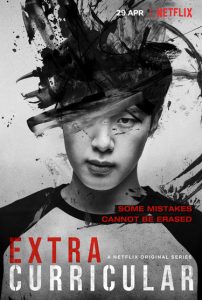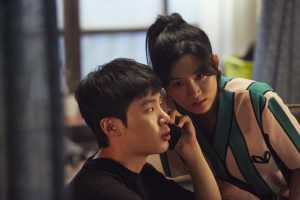
The Netflix original drama Extracurricular, directed by Kim Jin-Min, was released April 29th on the platform and shot straight to the top ten of Netflix Korea. Extracurricular’s plot revolves around a high school student who runs an illegal business and starts to face the consequences as his classmates begin to get involved. Extracurricular is unconventional in both content and manner, and serves as a great example of the versatility of Korean dramas when not restricted by broadcasting station standards.
The drama is centered around seemingly innocent second year high school student Oh Ji-Soo (played by Kim Dong-Hee), who leads a double life as anonymous pimp “Uncle” to support himself and earn enough money for university. His classmate Kang Min-Hee (played by Jung Da-Bin), works as one his sex workers, though she does not know who her boss is. However, Ji-soo’s popular classmate Bae Gyu-Ri (played by Park Ju-Hyun) finds out about his double life, and wants in on the business and profits for secretive reasons of her own. As Min-Hee’s boyfriend, Kwak Ki-Tae (played by Nam Yoon-Su), as well as school staff and police start to get suspicious, Ji-Soo races to keep both the money and the secret intact.
A plot that revolves around high school students involved in crime is a stark contrast from other dramas with high school settings. If other dramas tend to be about growing pains and first love, this drama features much darker questions: what is crime, and what drives people to do it? This question is explored through Ji-soo and his classmates, who all get involved in crime for different reasons. In the beginning, Ji-soo insists that he runs a security business to protect willing sex workers. Is it truly a crime if he has employees who have consented to the work that they will be doing? His classmate Min-hee is a consenting sex worker, although she is underage. Is Ji-soo still a criminal then if consent is given, or does he automatically qualify as a criminal because she is a minor? These questions are indirectly addressed in a discussion held during a meeting of the social research issues club, which Ji-soo and Gyu-ri are the sole members of. The heavy topic and involvement of minors is not underestimated by the producers, as every episode ends with a message encouraging youth to reach out to adults or help centers.
The uncensored nature of the drama also adds to its unconventionality. Tattoos and knives, which are often blurred in dramas aired through broadcasting stations, are not blurred out. Futhermore, sex and sex work, important topics in the drama, are discussed casually. Though the extreme lengths taken by the characters may seem unrealistic, the uncensored swearing certainly contributes to the realistic portrayal of the students. Ji-soo and his classmates use curse words like normal high school students would, which is a refreshing departure from other dramas where dialogue is restricted to few and tame vulgarities. Through its plot, topic, and dialogue, Extracurricular proves itself to be different from other dramas.

Despite featuring heavier topics and only being available on Netflix, Extracurricular has received a strong but mixed reaction from the domestic audience. The main critique of the drama revolves around the graphic nature of the drama, such as the three-way fight scene at a karaoke place. Indeed, though the drama is about high school students, it is rated R and not supposed to be for a teenage audience. Extracurricular has also received much praise for its acting, especially by the four high school students. All four actors had to audition for their roles where their chances of getting picked were 600 to 1, and Kim, Jung, Park, and Nam leave no space to doubt why they were chosen. All four are exceptional in their roles as students who are pushed to the edge as they deal with the consequences of the choices they make getting involved in crime.
The strong reaction to Extracurricular, which peaked at number one on Netflix Korea’s top ten list, may be because it is reminiscent of the recent Nth room case in Korea. The Nth room case, which recently made headlines around the world, involved women and girls who were blackmailed and forced into cybersex trafficking. The drama completed production before the case came to light; however, director Kim Jin-min admits that the crucial role of technology and cellphone apps are eerily similar in the drama and the Nth room case. Though Ji-soo shows no remorse in hiring minors and makes some very questionable decisions, there is a significant difference between reality and the screen: Ji-soo only employs willing sex workers. When a new employee starts to have doubts about their first job, Ji-soo assures him that he is free to walk away. The two-faced nature of Ji-soo as a quiet, smart student versus a secretive pimp also reinforces that sometimes bad people are hiding right in front of us, as the Nth case has also shown. Indeed, the similarity between the dark realities on- and off-screen is a likely reason behind the popularity of Extracurricular.

The factors that make Extracurricular unique would not have been possible without Netflix. Its rare subject matter and explicit scenes and dialogue prove the creativity and freedom that drama creators have when they are not restricted by broadcasting station restrictions. The popularity of the drama despite its 19+ age restriction, which itself is rare for dramas, suggests that there is a receptive market for dramas that tackle heavier topics in an uncensored manner.
In comparison to broadcasting stations, Netflix can offer a higher budget and a new space for dramas that deal with more peculiar topics such as zombies in Kingdom or controversial themes such as teenagers steeped in crime in Extracurricular. Indeed, Netflix originals such as Extracurricular are a chance for Korean creators to showcase a different side of Korean dramas on a global platform. As the young characters on screen get involved in sometimes extreme, often graphic, violence and crime, the crude dialogue of the teenagers helps reinforce the fact that these are truly kids that are both victims and perpetrators of crime. Though swearing may seem like a small detail, the extent to which it is in the dialogue would not have been possible without Netflix. Though the number of original Korean Netflix dramas are limited, Netflix has the capacity to sustain a space for dramas not bound by traditional drama conventions or broadcasting station restrictions.
Extracurricular, distinct in its plot and style, is a great example of the versatility of Korean dramas when they are not bound by usual restrictions. A Netflix original that features young characters addressing questions involving crime, Extracurricular is both intriguing and intense, especially when the Nth room case is considered. The entire series is currently available on Netflix, and the gripping plot driven by the characters that elicit both pity and disgust makes for a great watch for those who are looking for some thrill.
(DongA [1][2], Yonhap, The Diplomat, Korea Economic Daily, The Guardian. Images via Netflix)


